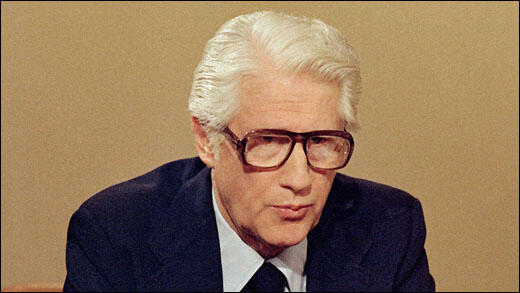On this day on 31st May
On this day in 1819 Walt Whitman, one of nine children, was born in West Hills, Long Island on 31st May, 1819. The family moved to Brooklyn in 1823 where his father found work as a carpenter.
Whitman left school at twelve and began work as a printer. He continued his studies and eventually became a teacher on Long Island and edited the local newspaper, the Long Islander.
In 1841 Whitman moved to New York. and worked for several newspapers including the editorship of New York Aurora and the Brooklyn Daily Eagle. A member of the Free-Soil Party, Whitman was a strong opponent of slavery and in 1848 his radical political views resulted in him being sacked as editor of the Brooklyn Daily Eagle.
After making several attempts at radical journalism, Whitman moved into the real estate business and made a living building and selling houses. Whitman continued to write and in 1855 he privately published a book of twelve poems entitled, Leaves of Grass. In the introduction to the book Whitman proclaimed himself the symbolic representative of common people. The sexual content of the poems resulted in some critics declaring it to be an immoral book. The book sold badly and unable to become a full-time poet, Whitman returned to journalism, working as editor of The Brooklyn Times (1856-1859).
A new edition of Leaves of Grass, which contained 124 new poems, appeared in 1860. Ralph Waldo Emerson praised the book but it was ignored by most critics at the time. However, Whitman's use of colloquial language and everyday events, represented a turning-point in the history of American poetry.
Whitman was a Radical Republican and was therefore a strong supporter of the Union Army during the American Civil War. His brother was wounded at Fredericksburg, and Whitman went there to visit him in hospital. When he returned to Washington he spent his spare time visiting soldiers at Armory Square Hospital. He also reported on the conflict for the New York Times. He also published two collections of war poems Drum Taps (1865) and Sequel to Drum Taps (1866). This included several poems in praise of Abraham Lincoln.
After the war Whitman worked as a clerk in the Department of the Interior in Washington but was dismissed when it was discovered he was the author of Leaves of Grass. The Secretary of the Interior, like many people at the time, considered it to be an indecent book. Whitman worked in a series of menial jobs and continued to write with Democratic Vistas appearing in 1871.
In 1873 Whitman suffered a paralytic stroke and for the next twenty years lived in a semi-invalid state. Whitman now left Washington for Camden, New Jersey where he spent the remainder of his life. A new edition of Leaves of Grass, now containing 293 poems, was published in 1881. He also published a collection of prose writings, Specimen Days (1881) and newspaper pieces, November Boughs (1888).
Walt Whitman died in on 26th March, 1892.
On this day in 1838 philosopher Henry Sidgwick, the third son of Reverend William Sidgwick and Mary Crofts was born in Skipton, Yorkshire. After the death of his father in 1841, the family moved to Bristol. He was educated at Rugby School and Cambridge University where he became a fellow of Trinity College. At first Sidgwick's main interest was moral philosophy but under the influence of John Stuart Mill, he turned to political economy.
Initially Sidgwick found Mill's views on women's rights as "violently radical" but was gradually won over. By 1867 he had joined Josephine Butler and Ann Jemina Clough in their struggle to obtain special university examinations for women.
In 1871 Sidgwick established Newnham, a residence for women who were attending lectures at Cambridge University. His fellow campaigner, Anne Jemina Clough, was invited to become principal and eventually Newnham College had its own tutorial staff.
Whereas Emily Davies at Girton College insisted that her students studied the same subjects as men and be expected to pass similar exams, at Newnham, Anne Jemina Clough and Sidgwick devised special courses for its undergraduates. Sidgwick also opposed the teaching of Greek and Latin, which formed a necessary preliminary for a degree at Cambridge University. Sidgwick had argued for a long time that classics had dominated boy's secondary education and he did not want the same thing to happen to girl's education.
In his book Methods of Ethics (1875), Sidgwick attempted to develop the utilitarian theories of John Stuart Mill. The following year Sidgwick married Eleanor Balfour, the sister of Arthur Balfour, the future British Prime Minister. Eleanor had been involved with the developments at Newnham College for several years and in 1880 became its vice-principal.
In 1881, Sidgwick campaigned, with success, for the admission of women to examinations at Cambridge University. However, he resigned from the University Council in protest at their refusal to grant degrees to women. Henry Sidgwick died of cancer in 1900.
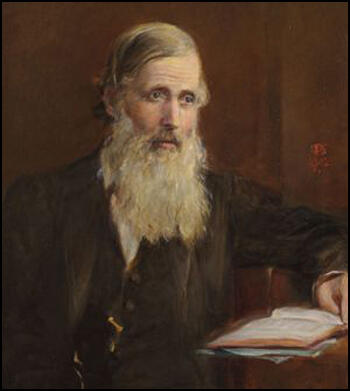
On this day in 1845 John Owens leaves instructions for the establishment of Owens College. Owens, the successful Manchester cotton merchant, held strong views on the relationship between education and religion. A Nonconformist, Owens objected to the dominate role that the Church of England played in education. Owens, who never married, decided that he would leave most of his wealth to help establish a further education college for men that would not have: "to submit to any test whatsoever of, their religious opinions".
John Owens died at his house in Chorlton-upon-Medlock on 29th July, 1846. In his will he left £96,654 for the establishment of the college. His Unitarian friends, John Fielden and Thomas Ashton, also raised money for the venture and arranged to purchase the former home of Richard Cobden, in Quay Street, Deansgate. This became the first premises of Owens College when it was opened in 1851.
The Nonconformist business community in Manchester continued to raise money for this venture and supported by Charles Prestwich Scott, the editor of the Manchester Guardian, the trustees were able to arrange the building of new premises at Oxford Street. Designed by Alfred Waterhouse, the new Owens College was opened in 1873. Seven years later, the college, along with those in Liverpool and Leeds, became Victoria University. In 1902 Liverpool, Leeds and Machester obtained charters as independent universities.
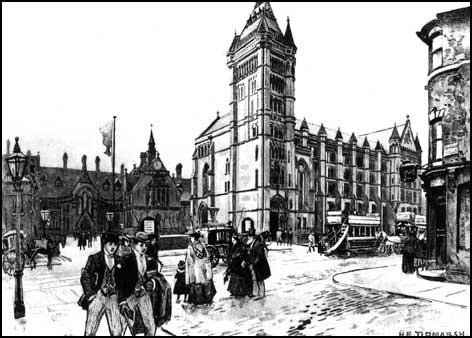
On this day in 1864 John Fremont agrees to be the presidential candidate for the Radical Republications. John Fremont was born in Savanannah, Georgia, on 21st January, 1813. Educated at Charleston College, he taught mathematics before joining the Army Topographical Engineers Corps in 1838. The following year Fremont joined a party led by Joseph N. Nicollet, that surveyed and mapped the region between the upper Mississippi and Missouri rivers.
Fremont surveyed the Des Moines River in 1841. Sponsored by the Missouri senator, Thomas Hart Benton, in 1842 Fremont mapped most of the Oregon Trail and climbed the second highest peak in the Wind River Mountains, afterwards known as Fremont Peak.
In 1843, with Kit Carson and Tom Fitzpatrick as his guides, Fremont's party followed the Cache de la Poudre River into the Laramie Mountains. He then crossed the Rocky Mountains via the South Pass and Green River. He then followed the Bear River until it reached the Great Salt Lake.
After spending time at Fort Hall he followed the Snake River past Fort Boise to Fort Vancouver, where he met John McLoughlin. Fremont then turned south where he explored Klamath Lake and the Great Basin before making a midwinter crossing of the Sierra Nevada mountains and despite great hardships reached Sutter Fort. Fremont eventually reached St. Louis on 6th August, 1844.
Fremont made his third expedition in 1845 during which he explored the Great Basin and the Pacific coast. While this was taking place the Mexican War started. Fremont was given the rank of major in the United States Army and helped annex California. Commodore Robert Stockton appointed Fremont as governor of California. However, in 1847 Fremont clashed with General Stephen Kearny and as a result was arrested for mutiny and insubordination and was subsequently court-martialed. President James Polk intervened and Fremont was eventually released.
In the winter of 1848 and 1849 Fremont led an expedition to locate passes for a proposed railway line from the upper Rio Grande to California. During the Californian Gold Rush gold was discovered on his estate and he became a multi-millionaire.
In 1850 Fremont was elected as senator for California. A strong opponent of slavery, Fremont founder member of the Republican Party. In 1856 Fremont was chosen as its first presidential candidate and although the Democratic Party candidate, James Buchanan, won with 1,838,169 votes, he did well to obtained the support of 1,335,264 electors.
When Abraham Lincoln was elected president in 1860, Fremont was expected to be appointed to the Cabinet. Lincoln was reluctant to do this and instead proposed that Fremont should be appointed minister of France. William H. Seward, Secretary of State, objected, claiming that as Fremont had been born in Georgia, he could not be trusted to remain loyal during a conflict with the South.
On the outbreak of the American Civil War Fremont was appointed as a Major General in the Union Army and put in command of the newly created Western Department based in St. Louis. On 30th August, 1861, Freemont proclaimed that all slaves owned by Confederates in Missouri were free. Abraham Lincoln was furious when he heard the news as he feared that this action would force slave-owners in border states to join the Confederate forces. Lincoln asked Fremont to modify his order and free only slaves owned by Missourians actively working for the South. Fremont refused claiming that "it would imply that I myself thought it wrong and that I had acted without reflection which the gravity of the point demanded."
Montgomery Blair, the Postmaster General,who had originally supported the appointment of Fremont, now urged Abraham Lincoln to sack him. Lincoln responded by sending Simon Cameron, Secretary of War, Congressman Elihu Washburne and General Lorenzo Thomas to investigate the situation in St. Louis. After they reported back to Lincoln he decided to relieve Fremont of his command. He was replaced by the conservative General Henry Halleck.
Horace Greeley, editor of the New York Tribune, wrote an open letter to Abraham Lincoln defending Fremont and criticizing the president for failing to make slavery the dominant issue of the war and compromising moral principles for political motives. Lincoln famously replied: "My paramount object in this struggle is to save the Union, and is not either to save or destroy slavery. If I could save the Union without freeing any slave, I would do it; and if I could save it by freeing all the slaves, I would do it."
Fremont was a popular figure with Radical Republications and in March, 1862, Abraham Lincoln agreed to appoint him as the commander of the newly established Mountain Department. However, Fremont was severely criticized for failing to deal with Thomas Stonewall Jackson during his Shenandoah Valley. On 26th June, Freemont's troops came under the command of General John Pope. Fremont refused to serve under Pope and spent the rest of the war in New York.
In May, 1864 a convention of Radical Republications selected Fremont as their candidate for president. Fremont accepted the nomination and told the audience: "Today we have in this country the abuses of a military dictation without its unity of action and vigor of execution." The idea of a radical candidate standing in the election worried Abraham Lincoln and negotiations began to persuade him to change his mind. Fremont's price was the removal of his old enemy, Montgomery Blair, from the Cabinet. On 22nd September, 1864, Fremont withdrew from the contest. The following day, Lincoln sacked Blair and replaced him with the radical, William Dennison.
After the American Civil War Fremont became involved in railroad financing and building. This was a failure and he lost the fortune that he made during the Californian Gold Rush. He returned to politics when he became governor of Arizona Territory (1873-83).
Fremont wrote several books including several about his expeditions and his autobiography, Memories of My Life (1887).
John Fremont died in New York City on July 13, 1890.
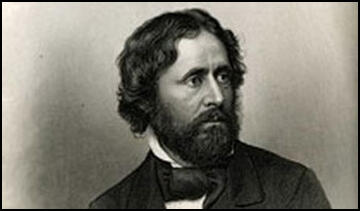
On this day in 1875 May Billinghurst, was born in Lewisham. Her father, Henry Billinghurst, was a banker. Her mother, Rosa Brinsmead, was the daughter of a wealthy piano manufacturer. A healthy child at birth but when she was five months old, she suffered an illness which left her whole body paralysed, and although she regained the use of her hands and arms she would never walk unaided.
The Billinghurst family paid for a governess to provide her with a good basic education. However, her disability made it impossible for her to go to university. Her sister, Alice Billinghurst, was a superintendent at a local children's home, arranged for her to do voluntary work for the Greenwich and Deptford Union Workhouse. She was shocked by what she saw and later recalled: "My heart ached and I thought surely if women were consulted in the management of the state happier and better conditions must exist for hard-working sweated lives such as these."
May Billinghurst became interested in politics and the subject of women's suffrage. She later recalled: "My heart ached and I thought surely if women were consulted in the management of the state happier and better conditions must exist for hard-working sweated lives such as these... It was gradually unfolded to me that the unequal laws which made women appear interior to men were the main cause of these evils. I found that the man-made laws of marriage, parentage and divorce placed women in every way in a condition of slavery - and were as harmful to men by giving them power to be tyrants."
She attended meetings where she heard Millicent Fawcett, Charlotte Despard and Emmeline Pankhurst give speeches. However, it was Christabel Pankhurst who inspired her to become a suffragette: "I wondered how the public could ever be made to think about it. In the midst of the hopelessness of it all Christabel Pankhurst sounded the war note of militancy and was imprisoned for her boldness, and the subject of votes for women was on every tongue." May joined the Women's Social and Political Union (WSPU) in October 1907. Over the next few months her family donated a considerable sum of money to the organisation.
Billinghurst also left the Liberal Party in protest to the way they had dealt with the issue of women's suffrage. She wrote to the Manchester Guardian where she argued: "I feel that the present government is not acting in accordance with the first principles of Liberalism, by refusing the right of representation to women taxpayers. I have joined no other party and I still claim to be a Liberal woman but a Liberal woman on strike."
In July 1910 Billinghurst she became the secretary of the Greenwich branch of the WSPU. In November Billinghurst was one of 159 women arrested at a demonstration outside the House of Commons. Afterwards she recalled: "At first the police threw me out of the machine on to the ground in a very brutal manner. Secondly when on the machine again they tried to push me along with my arms twisted behind me in a very painful position. Thirdly they took me down a side road and left me in the middle of a hooligan crowd, first taking all the valves out of the wheels and pocketing them so that I could not move the machine."
Another suffragette later testified: "Her crutches were lodged on each side of her self-propelling invalid chair and when a meeting was being broken up or an arrest being made she would charge the aggressors at a rate of knots that carried all before her. When the police retaliated and tried to control this she ran the risk of being ejected on to the ground, where she was quite helpless. Of course she took the risk with her eyes open and when this happened, as it did on occasion, made full and unscrupulous use of her infirmities so as to obtain the maximum publicity for the cause."
Fran Abrams the author of Freedom's Cause: Lives of the Suffragettes (2003) argues that May Billinghurst became an important figure in the WSPU campaign: "May Billinghurst was no fool. She knew full well, and so did the leaders of the WSPU, that her hand-propelled invalid tricycle gave her a special advantage in the propaganda battle they were waging. It made it difficult, if not impossible, for the media to portray May as a howling harridan with little care for the safety of others. At its least effective the sight of her at a demonstration was a picturesque one, commented on lightly along with other aspects of the pageantry of the day. At best, it served to underline in bold the brutal tactics of the police and the vulnerability of the suffragette demonstrators."
In November 1911, May Billinghurst was arrested again. Henry Nevinson reported: "Just at that time as I was returning to Whitehall I met Miss Billinghurst, that indomitable cripple, being carried shoulder high by four policemen in her little tricycle or wheel-cart that she propels with her arms. Amid immense cheering from the crowd she followed the rest into the police station."
One newspaper claimed that she had "set her chair going at full tilt towards the police". May Billinghurst was charged with obstruction and sentenced to five days' imprisonment or a five shilling fine. Someone must have paid the fine because there is no record of her having gone to Holloway Prison on this occasion.
In March 1912 the WSPU organised a new campaign that involved the large-scale smashing of shop-windows. May agreed to hide some of the stones underneath the rug covering her knees. According to Votes for Women: "From in front, behind, from every side it came - a hammering, crashing, splintering sound unheard in the annals of shopping... At the windows excited crowds collected, shouting, gesticulating. At the centre of each crowd stood a woman, pale, calm and silent."
May Billinghurst was arrested and was eventually sentenced to one month's hard labour. She spent the time in Holloway Prison although the authorities found that the "hard labour" part impossible to enforce. A fellow prisoner, Alice Ker, a doctor from Liverpool, wrote to her daughter on 7th April: "Miss Billinghurst, the tricycle lady, is going out on the 11th and will take this (letter). She is quite lame, wears irons on her legs and walks with crutches when she is out of her tricycle. We shall miss her very much when she goes out."
On her release she took part in the campaign to destroy the contents of pillar-boxes. By December 1912, the government claimed that over 5,000 letters had been damaged by the WSPU. A fellow suffragette, Lilian Lenton, argued: "She (May Billinghurst) would set out in her chair with many little packages from which, when they were turned upside down, there flowed a dark brown sticky fluid, concealed under the rug which covered her legs. She went undeviatingly from one pillar box to another, sometimes alone, sometimes with another suffragette to do the actual job, dropping a package into each one."
May Billinghurst was eventually arrested at Blackheath preparing for a pillar-box raid. She seemed pleased about being caught as she told the police officer: "With all the pillar boxes we've done, there has been nothing in the papers about it - perhaps now there has been an arrest there will be something." May appeared at the Old Bailey in January 1913.
During the trial Billinghurst argued: "The government authorities may further maim my body by the torture of forcible feeding as they are torturing weak women in prison at the present time. They may even kill me in the process for I am not strong, but they cannot take away my freedom of spirit or my determination to fight this good fight to the end."
Billinghurst was found guilty and sentenced to eight months in Holloway Prison. The judge remarked: "No one could, I think, doubt for a moment - as mistaken as I think you to be - that you were animated by the highest and purest motives in what you did... you do not belong to the class of hysterical women, many of whom are associated with this movement, who appear to be animated mainly or at any rate in some measure by a desire for notoriety." Emmeline Pankhurst wrote from Paris: "I cannot tell you how deeply I feel your splendid courage and endurance. All my heart will be with you during the ordeal that lies before you."
May Billinghurst immediately went on hunger-strike: "I just laid on my back and endured it all - on Sunday I was very weak and on Sunday night I tried to get out to the bell because my head was swimming round so I fell on the floor and fainted... My head was forced back and a tube jammed down my nose. It was the most awful torture. I groaned with pain and I coughed and gulped the tube up and would not let it pass down my throat. Then they tried the other nostril and they found that was smaller still and slightly deformed, l suppose from constant hay-fever. The new doctor said it was impossible to get the tube down that one so they jammed it down again through the other and I wondered if the pain was as bad as child-birth. I just had strength and will enough to vomit it up again and I could see tears in the wardresses' eyes."
After protests about her treatment by George Lansbury and Keir Hardie in the House of Commons, and comments from the prison doctor, who feared she would die of a heart-attack, she was released on 18th January, 1913. While May was living at home her mother received an anonymous letter: "Do not allow your daughter to go out in the neighbourhood of Blackheath alone or she will be it worse cripple than she now is - as she will be treated as a coward (which she is considered to be) for not taking her punishment. If you can leave the neighbourhood do so as sooner or later she will be attacked (and possibly yourself as you are much disliked for being the mother of a coward)."
On 21st May 1914, May Billinghurst took part in a WSPU demonstration outside Buckingham Palace. This eventually turned into a battle between the suffragettes and 1,500 policemen. Billinghurst drove her tricycle into the police lines. Charlotte Drake was one of those taking part in the protest: "I was beside her. They threw us back, but we returned. Two policemen picked up the tricycle with Miss Billinghurst in it, turned it over and dropped her to the ground. The excitement gave me strength - I picked her up bodily and lifted her back. We straightened the machine as best we could, rested a little to rake breath and struggled on again."
On 4th August, 1914, England declared war on Germany. The leadership of the WSPU began negotiating with the British government. On the 10th August the government announced it was releasing all suffragettes from prison. In return, the WSPU agreed to end their militant activities and help the war effort.
After receiving a £2,000 grant from the government, the WSPU organised a demonstration in London. Members carried banners with slogans such as "We Demand the Right to Serve", "For Men Must Fight and Women Must work" and "Let None Be Kaiser's Cat's Paws". At the meeting, attended by 30,000 people, Emmeline Pankhurst called on trade unions to let women work in those industries traditionally dominated by men.
Billinghurst supported this change in policy and she took part in these various pro-war demonstrations. In 1918 she helped Christabel Pankhurst in her attempt to be elected to represent The Women's Party in the House of Commons.
After the passing of the Qualification of Women Act May Billinghurst ceased to be politically active. However, she did attend the funeral of Emmeline Pankhurst and the unveiling of her statue in 1930.
May Billinghurst died in Weybridge on 29th July 1953.
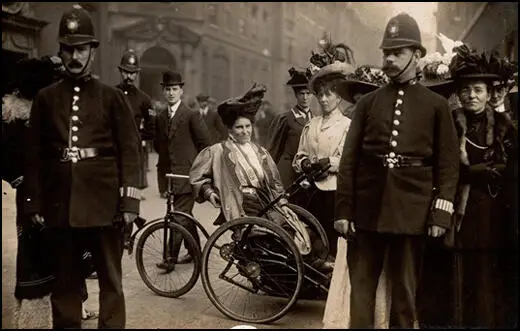
On this day in 1914 Kitty Marion, with the help of Mary Leigh, escaped to Paris. A member of the Young Hot Bloods she had endured 232 force-feedings in prison while on hunger strike.
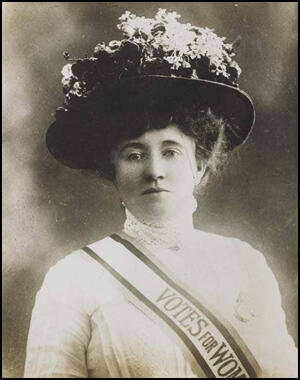
On this day in 1915 first Zeppelin raid on London. Count Ferdinand Zeppelin, a German army officer, began developing his ideas on airships in 1897. The first Zeppelin flew on 2nd July 1900. The LZ-3 Zeppelin was accepted into army service in March 1909. By the start of the First World War the German Army had seven military Zeppelins.
The Zeppelin developed in 1914 could reach a maximum speed of 136 kph and reach a height of 4,250 metres. The Zeppelin had five machine-guns and could carry 2,000 kg (4,400 lbs) of bombs.
In January 1915, two Zeppelin navel airships 190 metres long, flew over the east coast of England and bombed great Yarmouth and King's Lynn. The first Zeppelin raid on London took place on 31st May 1915. The raid killed 28 people and injured 60 more.
Many places suffered from Zeppelin raids included Edinburgh, Gravesend, Sunderland, the Midlands and the Home Counties. By the end of May 1916 at least 550 British civilians had been killed by German Zeppelins.
Many places suffered from Zeppelin raids included Edinburgh, Gravesend, Sunderland, the Midlands and the Home Counties. By the end of May 1916 at least 550 British civilians had been killed by German Zeppelins.
Zeppelins could deliver successful long-range bombing attacks, but were extremely vulnerable to attack and bad weather. British fighter pilots and anti-aircraft gunners became very good at bringing down Zeppelins. A total of 115 Zeppelins were used by the German military, of which, 77 were either destroyed or so damaged they could not be used again. In June 1917 the German military stopped used Zeppelins for bombing raids over Britain.

On this day in 1916 the Battle of Jutland takes place.
https://spartacus-educational.com/FWWjutland.htmOn this day in 1927 Clement Attlee makes speech on the need for strong trade unions. (103)
https://spartacus-educational.com/TUattlee.htm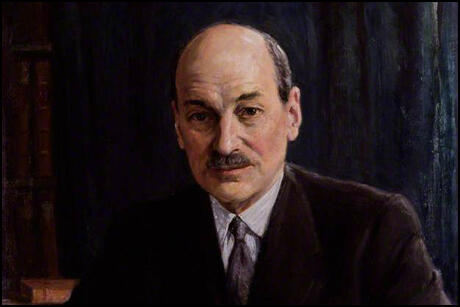
On this day in 1945 General Dwight D. Eisenhower, in a letter to Colin Gubbins, praises the work of the Special Operations Executive.
Since I assumed the Supreme Command in January 1944, until the present day, its work has been marked by patient and far-sighted planning, flexible adaptation to the operational requirements of Supreme Headquarters, and efficient executive action during operations.
In no previous war, and in no other theatre during this war, have resistance forces been so closely harnessed to the main military effort. While no final assessment of the operational value of resistance action has yet been completed, I consider that the disruption of enemy rail communications, the harassing of German road moves and the continual and increasing strain placed on the German war economy and internal security services throughout occupied Europe by the organized forces of resistance, played a very considerable part in our complete and final victory.
The combination of certain sections of your two organizations, first established as Special Force Headquarters under the joint command of Brigadier Mockler-Ferryman and Colonel Haskell, was the means by which these resistance forces were so ably organized, supplied and directed. Particular credit must be due to those responsible for communications with occupied territory. I am also aware of the care with which each individual country was studied and organized, and of the excellent work carried out in training, documenting", briefing and dispatching agents. The supply to agents and resistance groups in the field, moreover, could only have reached such proportions during the summer of 1944 through outstanding efficiency on the part of the supply and air liaison staffs. Finally, I must express my great admiration for the brave and often spectacular exploits of the agents and special groups under control of Special Force Headquarters.
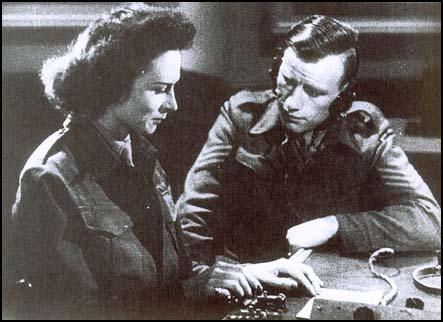
On this day in 1945 Archdeacon of Lancaster argues that Martin Niemöller should not be allowed into the UK. In 1945, with the Allies moving in on Germany, Niemöller, Alexander von Falkenhausen, Kurt von Schuschnigg, Leon Blum, and other political prisoners were transferred to Tirol in Austria by the SS. The original plan was to execute them but they were rescued by the Allies just before the end of the Second World War.
On 5th June 1945 Niemöller gave a press conference in Naples. He admitted that he had offered to join the German Navy in 1939. He also confessed that he had "never quarrelled with Hitler over political matters, but purely on religious grounds". This resulted in a savage attack on Niemöller from those newspapers that had presented him as a symbol of resistance to Hitler's government. It was now pointed out that Niemöller had never opposed the Nazi racial theories, but merely the suppression of the Church in Germany.
When it was suggested that Niemöller wanted to visit Britain there was a campaign to keep him out of the country. Tom O'Brien of the TUC General Council wrote: "I sincerely hope he will not be allowed to come. If he is, it will be the first overt move of the Germans to "organise sympathy", as they did so successfully and so hypocritically after the last war. Niemöller commanded a U-boat in the last war and, with his brother commanders, was responsible for the drowning of many unarmed British merchant seamen. In this war he volunteered to serve under Hitler. He was (and may now be) as nationalistic as any of his congregation at the fashionable Berlin church to which he ministered."
The Daily Telegraph pointed out that Niemöller should be denied entry as there was "no record that he ever denounced Hitler's crimes against humanity or condemned the war". The Home Secretary agreed and announced that Niemöller would not be allowed to visit Britain.
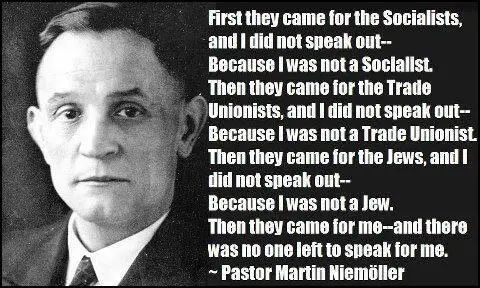
On this day in 1989 C. L. R. James died. Cyril Lional Robert James, the son of a schoolteacher, was born in Tunapuna, Trinidad, on 4th January, 1901. He was deeply influenced by his mother who was a avid reader. A very intelligent child, at the age of six he won won a scholarship to Queens Royal College. As a young man James met George Padmore and the two men became close friends.
After leaving college James worked as a school teacher and as a cricket reporter. He also wrote two novels, La Divina Pastora (1927) and Triumph (1929). He took a keen interest in politics and wrote a biography of the Trinidadian labour leader, Arthur Cipriani. The book, Life of Captain Cipriani was published in 1929.
The cricketer, Learie Constantine, suggested that James should emigrate to England. He arrived in 1932 and for a while lived with Constantine in Nelson, Lancashire. He also managed to get work reporting cricket matches for the Manchester Guardian. James was a strong supporter of West Indian independence. A pamphlet that he wrote, The Case for West Indian Self-Government, was published in 1933 by Leonard Woolf.
James moved to London and during this period he studied the work of Karl Marx, Friedrich Engels and Leon Trotsky. He initially joined the Independent Labour Party (ILP) and after moving to London became chairman of its Finchley branch. He also wrote for left-wing journals such as the New Leader and Controversy. James became a Marxist and left the ILP to form the Revolutionary Socialist League. James, now a follower of Trotsky, was highly critical of the government of Joseph Stalin and the British Communist Party.
In 1936 James published Minty Alley. The novel was based on his childhood in Trinidad. He also wrote a play about Toussaint Louverture, the leader of the Haitian revolution, and in 1936 Paul Robeson played the leading role at its production at the Westminster Theatre.
James also published several books on politics including Abyssinia and the Imperialists (1936), World Revolution 1917-1936 (1937). This history of the Comintern was highly critical of Stalin's 1924 pronouncement, "Socialism in One Country" and provided support for the ideas of Leon Trotsky. His study of the Haitian revolution, The Black Jacobins, was published in 1938.
James moved to the United States in October 1938. He lectured on political issues and continued to published books about politics including Dialectical Materialism and the Fate of Humanity (1947), Notes on Dialectics (1948),The Revolutionary Answer to the Negro Problem in the USA (1948), State Capitalism and World Revolution (1950) and The Class Struggle (1950). James also wrote extensively about the work of Walt Whitman and Herman Melville.
The Marxist writings of James upset Joseph McCarthy and fellow right-wingers and he was eventually deported from the United States. James lived for a while in Africa but in 1958 returned to the West Indies. Influenced by the events of the Hungarian Rising in 1956, this book Facing Reality (1958) reveals a disillusionment with both Communism and Trotskyism. During this period he worked on a biography of George Padmore and parts of the book appeared in The Nation journal.
In 1963 James published Beyond a Boundary. The book is a combination of autobiography and a detailed analysis of sport and politics. Other books by James include Radical America (1970) and Nkrumah and the Ghana Revolution (1977) and Radical America (1970).
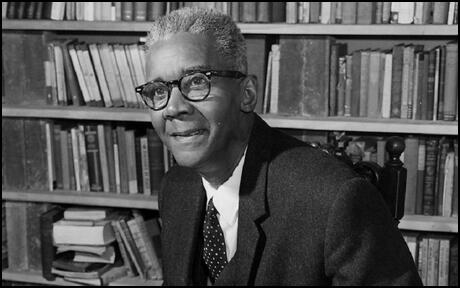
On this day in 2005, John O'Connor, a lawyer working for Mark Felt, told Vanity Fair magazine that his client was Deep Throat. Shortly afterwards Bob Woodward confirmed that Felt had provided him with important information during the Watergate investigation. Ben Bradlee also said that Felt was Deep Throat. However, Carl Bernstein was quick to add that Felt was only one of several important sources.
However, there are serious problems with the idea that Mark Felt was Deep Throat. In his autobiography, The FBI Pyramid: Inside the FBI, Felt denied being Deep Throat and said he met with Woodward only once. Felt's last word on the subject came in 1999, on the 25th anniversary of Nixon's resignation, when he told a reporter that it would be "terrible" if someone in his position had been Deep Throat. "This would completely undermine the reputation that you might have as a loyal employee of the FBI," he said. "It just wouldn't fit at all."
Felt had not made the confession himself. In 2001 Felt suffered a stroke that robbed him of his memory. Before this happened Felt had told his daughter Joan that he was Deep Throat. She admits that the family have gone public in an attempt to obtain money. Joan Felt told journalists: "My son Nick is in law school and he'll owe $100,000 by the time he graduates. I am still a single mom, still supporting them (her children) to one degree or another."
Vanity Fair only paid the Felt family $10,000 (£5,500) but the whole project is linked to a $1m book deal. It is rumoured the book will be written by Bob Woodward. However, on 4th June, 2005, the publisher Judith Regan (HarperCollins) revealed that negotiations over a possible book deal had collapsed because of serious concerns that Felt was no longer of sound mind.
There are several major problems with Mark Felt being Deep Throat. Felt resigned from the FBI. in June, 1973 and no longer had to worry about his career. Why did he not come forward with his information at this stage of the Watergate investigation? He would have been seen as a national hero and would no doubt have made a fortune from his memoirs.
In November, 1980, Felt was convicted of conspiring to violate the constitutional rights of Americans by authorising illegal break-ins and wire taps of people connected to suspected domestic bombers. Why did Felt not attempt to rebuild his public image by disclosing that he was Deep Throat?
If Felt had been Deep Throat why did he not tell Woodward about the role played by Alfred Baldwin in the Watergate break-in. The FBI knew about this within days of the break-in. Yet Woodward did not mention it in his articles until the story was revealed by a press conference held by the Democratic Party in September, 1972.
According to Woodward it was Deep Throat who first suggested that Alexander P. Butterfield could be an important figure in the investigation. In May, 1973, Woodward told a member of the Senate Watergate Committee that Butterfield should be interviewed. On Friday, 13th July, Butterfield appeared before the committee and was asked about if he knew whether Richard Nixon was recording meetings he was having in the White House. This was the best-kept secret in the White House with only a few people knowing about its existence. How could Felt have known about this system?
Felt left the FBI in June 1973. Yet according to All the President's Men Woodward he continued to meet Deep Throat after this date. The most important of these meetings took place in the first week of November, 1973. At this meeting Deep Throat told Woodward that their were "gaps" in Nixon's tapes. He hinted that these gaps were the result of deliberate erasures. On 8th November, Woodward and Bernstein published an article in the Washington Post that said that according to their source the "conversation on some of the tapes appears to have been erased". It has been claimed by several writers that only a very small group of people could have known about these gaps at this time. How could Felt had known about this?
Maybe he did have meetings with Woodward in underground garages. However, if Felt was Deep Throat, he was getting information from someone working in the White House. He also had to get information from someone senior in the CIA. The most sensible explanation is that Deep Throat was more than one man. That is he represented several of Woodward's sources. If that is the case, I think Deep Throat was Mark Felt, William Sullivan, Richard Ober and Stephen Bull.
